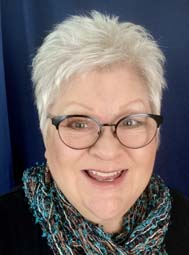Womaen’s Caucus interviewed candidates for the 2020 deferred and 2021 ballots which will be voted on by Annual Conference delegates in July. We asked the same questions for each position, plus one unique question based on something we read in the candidate’s profile. See all the candidates we interviewed here.

Program & Arrangements COmmittee
nathan hollenberg
Annual Conference is both a rock of ages and an agent of new community as we move online in 2021, and as first-timers attend every year. What AC practices, old and new, hold the greatest promise for uniting, strengthening and equipping the church to follow Jesus?
After a couple years of tense and hurtful district conferences in the Shenandoah district the decision was made to forgo business for a few years and instead have district conferences centered around worship. While Annual Conference business is an important and vital part of being the church together, I wonder what a reframing of conference might do to help build unity and to help refresh and empower individuals as they leave conference. We spend time in our districts doing “delegate briefings” to prepare leadership for the business of the church. While an important step, it may send the unintentional message that business is the most important part of conference. I wonder if there is a way to honor the importance of our decision making process while also emphasizing that the role of delegates and leaders at conferences needs to be deeper. If people are coming to a conference expecting “a fight” or tense theological/political debate, it’s difficult to build unity. I think worship, insight sessions, and fellowship are vital parts of the Annual Conference experience for “seasoned” and new participants alike and I wonder if we don’t adequately “brief” our delegates on this aspect of Annual Conference.
What is the role of Annual Conference worship within the denomination? How can it best be made meaningful for both fresh Brethren and cradle Brethren?
Annual conference worship at its best introduces us to the diverse body of believers that make up the Church of the Brethren. Worship at AC feels both familiar and yet fresh and new. The diversity of music, worship leaders, speakers, and visuals is a reminder that we are part of something bigger than just our local congregation. While I think Annual Conference worship has been a strong point of conference, I do wonder how we share this experience with our congregations. Very few across the denomination are able to experience the power of Annual Conference worship and so I would like to see Program and Arrangements provide resources for delegates and pastors to aid them in sharing the Annual Conference worship experience with their congregations. Not just a wrap-up DVD or recordings of sermons but an invitation and tools to lead worship and give a taste of their experience (much like we often encourage our youth to do following NYC).
AC worship and event planning frequently rely on personnel from near the conference location (which has been weighted heavily to Grand Rapids and Greenville). How can P&A include voices/cultural practices from areas of the country that will likely will not host an AC?
I appreciate the question because I think perhaps the most important step in building a more representative and diverse Annual Conference is awareness. I understand that the decision to host conferences in particular locations multiple times is rooted in stewardship (cost savings) but as the question suggests this practical and economic approach disproportionately impacts some sisters and brothers over others. While I am admittedly new to the Program and Arrangements process my hope is that after a year of online and virtual worship, and of learning new ways of being the body, that P&A could think more creatively on how to tap into leadership from all over and not just in a particular districts. Technology allows collaboration and planning in ways not available to past generations and so perhaps a new way of finding leadership for any given Annual Conference needs to be discerned.
Tell us about a context in which you are/were a minority (longer than a weeklong workcamp).
I cannot say in good faith that I have ever truly been a minority. As the question suggests without fully naming, the experiences I have had as “the minority” were often short-term and by choice. The only place I have felt like a minority for any stretch of time is being someone who identifies with a more progress theology in a largely conservative district and yet again, I recognize that even in this circumstance I have a lot of power and choice. All that to say this is an area I need to listen more and speak less.
Each candidate was asked the same questions, with one final unique question drawing on their profile.
Whether it’s Annual Conference, NYC, your local congregation, etc, how do you blend/balance giving your core constituents what they like with attracting new and/or minority communities? (A classic example is music – do we sing Great is Thy Faithfulness or 10,000 Reasons?)
I think Annual Conference in particular has done a good job of balancing what is familiar with new and culturally diverse forms of worship. There is always room to grow. In a singular worship service you can hear organ, guitar, four-part acapella harmony while hearing scripture read in English, Spanish, and visually in sign-language. At my home congregation we have tried to introduce familiar hymns in new ways with new instruments and slightly new rhythms as a way of “bridging the gap.” The two-service model that swept Christianity I think was the incorrect approach as it sent the unfortunate message that worship is all about our preferences. Instead, if worship can provide a diverse experience where multiple generations and communities can find themselves represented – then this sends the message that worship is about the community. So it’s not that we must decide between Great is Thy Faithfulness or 10,000 Reasons – maybe it’s both, or maybe it’s singing Fluye Espiritu Fluye and Move in our Midst.
I do feel the need to say that I am fully aware that many congregations feel limited in what they are able to offer during worship, especially when it comes to music. Perhaps this is again an area that P&A can provide some attainable resources for congregations.

program & arrangements committee
kim ebersole
Annual Conference is both a rock of ages and an agent of new community as we move online in 2021, and as first-timers attend every year. What AC practices, old and new, hold the greatest promise for uniting, strengthening and equipping the church to follow Jesus?
Worship services, insight sessions, and varied opportunities for people to gather and make connections with each other (either formally or informally, in person or electronically) are ways the Annual Conference experience can unite, strengthen, and equip us to be Jesus’ presence to each other and to the world.
What is the role of Annual Conference worship within the denomination? How can it best be made meaningful for both fresh Brethren and cradle Brethren?
Worshiping together unites us in spirit and body, helping us acknowledge our commonalities and bridge our differences, while opening us to possibilities of who and what we as the Church of the Brethren are called to be as the body of Christ in the world. Using a variety of music, worship formats, preaching styles, and participants can make worship more meaningful and open us to new spiritual insights and vitality.
AC worship and event planning frequently rely on personnel from near the conference location (which has been weighted heavily to Grand Rapids and Greensboro). How can P&A include voices/cultural practices from areas of the country that will likely will not host an AC?
While using the time and talents of people in the geographic area of Annual Conference may be practical, it is important to recognize that that practice may place a burden on a small group of people and limit the scope of the conference experience in unintended ways. The Program and Arrangements Committee can lessen those possibilities by calling Brethren/others from all geographical areas, theological perspectives, and cultural identities to assist with conference planning and implementation.
Tell us about a context in which you are/were a minority (longer than a weeklong workcamp).
A formative experience for me was when, as a white, middle-class teenager, I volunteered for several years in an inner-city mission whose participants were people of color. One day a woman came in who was bleeding profusely. As people tended to her, I questioned why they didn’t call for an ambulance. I was told that emergency response time in their community was typically very slow; ambulances took a long time to arrive, so they bound her wounds and took her to the hospital themselves. Living in the white suburbs, fast response to emergency situations was the norm and that day was an eye-opening experience, one that confirmed for me that white privilege is a very real thing in our country. That day I was a minority in their community, but I was still very much privileged because of the color of my skin.
Each candidate was asked the same questions, with one final unique question drawing on their profile.
Whether it’s Annual Conference, NOAC, your local congregation, etc, how do you blend/balance what is comfortable/familiar with what is creative/innovative? (In worship and otherwise)
I try never to say, “But we’ve always done it this way” and to say instead, “What is possible, what will enhance and enrich, what is new and revitalizing, what opens and expands?” while not alienating participation. Not change just for change’s sake, but how can we introduce something different to give a new perspective and make the experience fresh for participants.